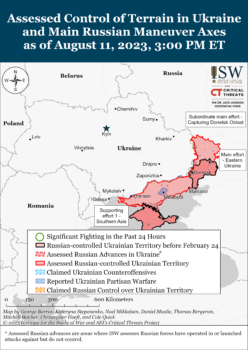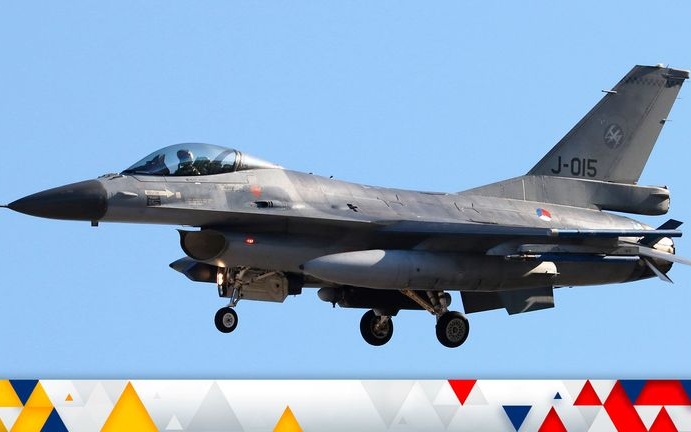A US-made F-16 fighter jet of the Dutch Air Force (AP)
Wednesday’s Coverage: Kyiv Rejects Ceding Territory to Russia In Return for NATO Membership

Map: Institute for Study of War
UPDATE 1921 GMT:
The US has sanctioned four Russians whom it says were involved in the poisoning of opposition leader Alexei Navalny in 2020.
The Treasury said all four are linked to Russia’s State security service FSB. Two are among the perpetrators of the poisoning of Navalny, who has now been condemned to 30 years in prison.
The sanctions were imposed under the 2012 Magnitsky Act, which authorizes the US Government to sanction those connected to gross violations of human rights in Russia.
UPDATE 1429 GMT:
Russian shelling in the Kharkiv region in northern Ukraine has killed a 60-year-old woman and injured another, her 61-year-old neighbor.
Governor Oleg Synegubov said the casualties were in Zaoskillya, east of Kupiansk, near the frontline.
UPDATE 1423 GMT:
Germany has delivered two more IRIS-T air defense systems, about 4,500 rounds of 155 mm ammunition, GO12 radars, and cargo transport. to Ukraine.
Presidential Chief of Staff Andriy Yermak tweeted:
🇩🇪 Many thanks to our partners for IRIS-T 🚀💪
Our sky will be more protected.
— Andriy Yermak (@AndriyYermak) August 17, 2023
UPDATE 1200 GMT:
NATO Secretary General Jens Stoltenberg has walked back comments by his chief of staff Stian Jenssen that Ukraine could cede territory to Russia in return for membership in the 31-nation bloc.
“It is the Ukrainians, and only the Ukrainians, who can decide when there are conditions in place for negotiations, and who can decide at the negotiating table what is an acceptable solution,” Stoltenberg said at a conference in Arendal, Norway.
Jenssen subsequently apologized for his remakrs.
Stoltenberg amplified, “His message, and which is my main message, and which is Nato’s main message, is, firstly, that Nato’s policy is unchanged — we support Ukraine.”
UPDATE 0740 GMT:
Russia has expelled Politico Europe’s Moscow correspondent Eva Hartog, who has reported from the country for 10 years.
The Russian Foreign Ministry told Hartog on Monday that her visa will not be extended and she has six days to leave the country. Hartog was told that the decision had been made by “relevant authorities”, but was given no further information.
Hartog, a Dutch citizen with Russian roots, moved to Moscow in 2013. She was an editor at the Moscow Times before joining the Dutch outlet De Groene Amsterdammer in 2019.
Russia had warned that it would respond directly to the European Union’s sanctions of “individuals responsible for disinformation”, including Russian bloggers, war correspondents, and reporters for the Russian State television and radio.
UPDATE 0720 GMT:
Russian authorities have charged Grigory Melkonyants, co-chairman of the voter rights movement Golos, with “organizing the activities of an undesirable organization”.
The homes of 14 people, including Melkonyants and regional coordinators of Golos, in eight Russian regions.
No details of the charges were released.
UPDATE 0709 GMT:
Considering the slide of the rouble, Russian officials have decided not to tighten currency controls for now, reports the outlet Vedemosti.
The was made at a meeting including Vladimir Putin and the head of the Central Bank, Elvira Nabiullina. Bloomberg reports that participants decided to consider the tightening of currency controls as a last resort.
The rouble has fallen by about 25% this year amid a halving of Russian oil revenues and a tightening of international sanctions. It broke the 100:1 mark v. the US dollar last weekend but, after a rise of Russia’s key interest rate from 8% to 12%, stands at 95:1 on Thursday.
The Government has informally agreed with exporters to increase the sale of their foreign exchange earnings, putting off an order for mandatory transactions. However, a Russian official said the order is inevitable if the situation does not improve.
The authorities of the Russian Federation have decided not yet to strengthen currency restrictions designed to strengthen the ruble exchange rate, Vedomosti reports, citing sources close to the government. According to them,
Earlier, Bloomberg wrote about the possible return of the requirement for the mandatory sale of part of the foreign exchange earnings by exporters. However, according to the newspaper’s sources, the participants of the meeting decided to consider the tightening of currency controls as a last resort.
UPDATE 0651 GMT:
Russian attacks on the Dnipropetrovsk region in south-central Ukraine killed one civilian and wounded seven on Wednesday.
Governor Serhii Lysak said attacks on Mezhivskyi and Nikopol damaged almost 50 private homes, agricultural facilities, an educational institution, and cars.
UPDATE 0621 GMT:
Ukraine President Volodymyr Zelenskiy has spoken about the latest Russian missile and drone strikes on port facilities and grain storage.
On Tuesday night, air defenses downed 13 Iranian-made Shahed “kamikaze” drones over the Odesa and Mykolaiv regions. However, debris damaged warehouses and granaries.
Zelenskiy said in his nightly address to the nation:
Last night, Russian terrorists again targeted our ports. Our infrastructure, which is involved in ensuring not ours, but the common — global — food security.
In just one month since Russia’s attempt to undermine the Black Sea Grain Initiative, this was the seventh, seventh massive Russian attack today. The port of Reni, the port of Izmail, Pivdennyi port, the port of Odesa, the port of Chornomorsk, Mykolaiv — every Russian attack on them is a blow to global food prices, a blow to social and political stability in Africa and Asia.
UPDATE 0614 GMT:
The former commander of Russia’s invasion of Ukraine died on Wednesday, reportedly from cancer.
Gen. Gennady Zhidko, who was head of Russia’s Eastern Military District forces, oversaw the Russian offensive operations to overrun the Luhansk region in summer 2022. He was dismissed from both positions after Ukraine’s counter-offensive in September liberated all of the Kharkiv regions and areas in the east.
Zhidko also was the Chief of Staff in 2016 of Russia’s military operations and mass killing of civilians in Syria, propping up the Assad regime.
ORIGINAL ENTRY: Ukraine has acknowledged that it will not receive US F-16 fighter jets in 2023.
Air Force spokesperson Yuriy Ihnat told a Ukrainian telethon late Wednesday, “It’s already obvious we won’t be able to defend Ukraine with F-16 fighter jets during this autumn and winter.”
The US has balked for months about providing the jets. Other Ukrainian allies have not been able to arrange delivery, pending training of Ukrainian pilots.
US President Joe Biden supported training programs in May. However, it was only last week that American officials said the first group of Ukrainians were ready to begin instruction.
A coalition of 11 other countries announced at July’s NATO summit that training would begin this month in centers in Denmark and Romania.
Poland and Slovakia supplied a total of 18 Soviet-made MiG-29s to Kyiv this spring.
But Ihnat said ruefully last night about the F-16:
We had big hopes for this plane, that it will become part of air defense, able to protect us from Russia’s missiles and drones terrorism….
We understand that our pilots will be trained in the near future. But at the same time, our air defense needs to be strengthened.

